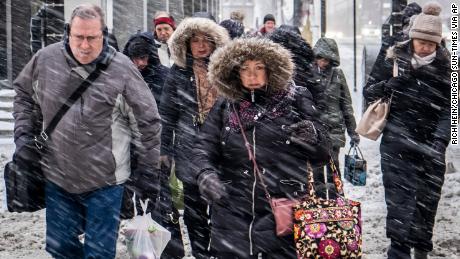(CNN)The climate crisis is already hurting our health and it could burden generations to come with lifelong health problems, a new report finds. It could challenge already overwhelmed health systems and undermine much of the medical progress that has been made in the last century.
If the world continues to produce the same amount of carbon emissions, a child born today could be living in a world with an average temperature that's 7.2 degrees Fahrenheit (4 degrees Celsius) warmer by their 71st birthday, according to the report, published Wednesday in the medical journal The Lancet.
On any given day, a 7.2-degree difference might not sound like much, but as an average increase in temperature, it would be devastating for our health.
"A business as usual trajectory will result in a fundamentally altered world," the report says. "The life of every child born today will be profoundly affected by climate change. Without accelerated intervention, this new era will come to define the health of people at every stage of their lives."
A warmer world means more disease, famine, early death from natural disasters such as fire and heat waves, and more major mental health problems. Everyone will be affected, but the most vulnerable will be disproportionately threatened: children, the elderly, people with underlying health conditions and the poor.
"The public doesn't fully see this as a human health crisis. Maybe polar bears were our early indicator -- the proverbial canary in the coal mine. But when you talk about this crisis, the bear images should be replaced with pictures of children," said Dr. Jonathan Patz, a professor and director of the Global Health Institute at the University of Wisconsin-Madison, who was not involved with the new report.
"Children are suffering from the climate crisis. They are suffering with asthma, diarrheal disease, dengue fever. It is so important for the public to understand the climate crisis is absolutely a human health crisis."
However, the report says, if the world takes bold action to curb carbon emissions, this dire future could be avoided.
What can solve the climate crisis
"As an emergency medicine doctor, the hardest cases for me to help are the ones where don't have a treatment, but in this case, we have a treatment available," said Dr. Renee Sallas, a lead author on the report. Salas is a clinical instructor of emergency medicine at Harvard Medical School and an emergency medicine physician at Massachusetts General Hospital.
The "treatment" was laid out in the Paris Climate Agreement goals. To limit warming to 1.5 degrees Celsius, global greenhouse gas emissions have to be cut by at least 45% of 2010 levels by 2030. They had to get to net zero by 2050.
Countries would need to take bold steps to get there, the report explains.
A child born in London today would no longer use electricity generated by coal by their 6th birthday if the UK met its climate goal.
A child born in France today wouldn't be driving a gas- or diesel-fueled car by their 21st birthday if the country met is climate goal.
The report suggests there has been "inadequate" global progress.
Worldwide coal production had been declining, for example, but from 2016 to 2018, the total primary energy supply from coal went up 1.7%. Subsidies for global fossil fuel consumption increased by 50% over the past 3 years.
President Donald Trump has begun the United States' formal withdrawal from the Paris Climate Agreement. In the US, carbon dioxide emissions rose by 2.8% in 2018 -- the largest increase since 2010, the report found.
"The world has yet to see a response from governments that matches the scale of the challenge," said Patz, a member of the National Academy of Medicine whose pioneering research has shown the health risks of the climate crisis.
Prices for renewable energy sources make them competitive with fossil fuels, yet "ironically this report shows too many countries still continue to subsidize fossil fuels," Patz said. "That is very concerning. It is a time of urgency. And the health benefits from clean energy far outweigh the investment costs."
Reasons for hope
The report did find some reasons to be hopeful.
China, for instance, is continuing to reduce its reliance on coal to generate electricity. That country is the world's largest carbon emitter.
Europe saw improvements in air pollution levels from 2015 to 2016.
Globally, more people are driving electric cars -- increasing 20.6% between 2015 and 2016, and making up 1.8% of all of China's total transportation fuel use, the report found.
Health systems are planning for the climate crisis, with 50% of countries saying they have plans and risk assessments in place to keep operating. Spending on adaptation funding for the health care system grew 11.8% over the past 12 months, the report found.
And yet the climate crisis has already brought the world some serious health problems.
Air pollution
Warmer temperatures make air pollution a much bigger problem, according to the report.
Pollution damages your lungs, your heart and can negatively impact every other vital organ. The impact accumulates over time, leading to problems later in life, as well as causing problems like asthma in the immediate term.
Already in 2016, there were 2.9 million premature premature deaths related to increasing pollution, the report found. With exposure to fine particulate air pollution, in 2016, 64,000 of these premature deaths were in the US. Previous reports have shown that the air quality is getting worse in the US, while the Trump administration has been weakening environmental regulations.
Spreading disease
As temperatures rise, there is more of a chance for disease to spread, the report found.
In 2018, temperatures were already suitable for the spread of a particular kind of bacteria that causes much of the world's wound infection and diarrheal disease.
The same year was considered the second-most hospitable climate for the spread of dengue fever. Nine of the 10 most favorable years for the spread of this disease have happened since 2000, according to the report.
Natural disasters
Heatwaves became a problem for populations in every region from 1990 to 2018. In 2018 alone, there were 220 million heatwave exposures globally. That's up from the previous record of 209 million exposures in 2015, according to the report.
Heatwaves have gotten longer and more frequent and can significantly increase a person's risk of death from exposure. Infants, children, pregnant women and the elderly are particularly vulnerable to heat-related problems such as heatstroke, hyperthermia and heat exhaustion.
Heatwaves also threaten workers. US workers, particularly those in agriculture and industry, lost nearly 1.4 billion potential labor hours between 2000-2018 and 81.4 million hours in 2018 alone from extreme heat, the report found.
Wildfires
Wildfires also became a bigger problem from 2001 to 2014, and the threat is growing. In that time, 77% of countries saw an increase in the number of people exposed to wildfires, the report found.
"It's important to keep in mind: There are not just the immediate risks from wildfires -- including death and displacement -- but there are more long-term consequences from breathing these air pollutants, including heart and lung disease," said Dr. Caren Solomon, an associate professor of medicine at Harvard Medical School and a physician at Brigham and Women's Hospital. "There are also associations with adverse pregnancy outcomes, such as premature birth -- not to mention major mental health effects." Solomon did not work on this report but has done other work on climate change and health.
"Often these issues don't get a lot of attention as it relates to climate change," she said. "We focus on the immediate, but these have negative health consequences long term."
Where do we go from here?
More than 120 experts from 35 agencies and institutions from all around the world worked on the new report. Scientists hope that policymakers will use this annual assessment of the climate crisis to prevent this serious threat to public health.
Get CNN Health's weekly newsletter
Sign up here to get The Results Are In with Dr. Sanjay Gupta every Tuesday from the CNN Health team.
"I think raising awareness through rigorous science can only benefit policymakers and the public at large, as it could lead to sound policy that would be feasible from a political standpoint. This report contributes to this important discussion," said Todd Pugatch, an associate professor at Oregon State University, who did not work on the report. Pugatch's research on the climate crisis found that natural disasters will likely become 52% more deadly if the climate crisis sees the worst case scenario.
"The more we contribute to this rigorous evidence base of the real threat of the climate crisis, hopefully, it will have a policy impact," he said.



























